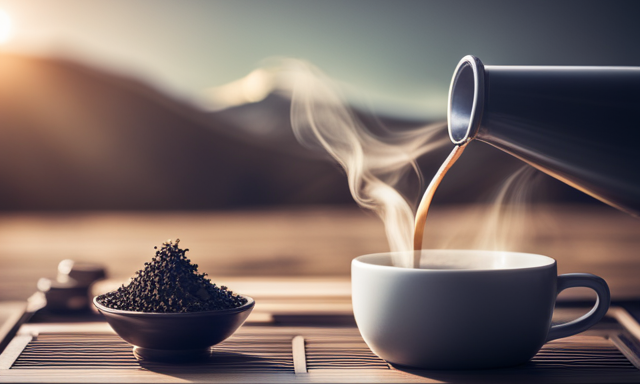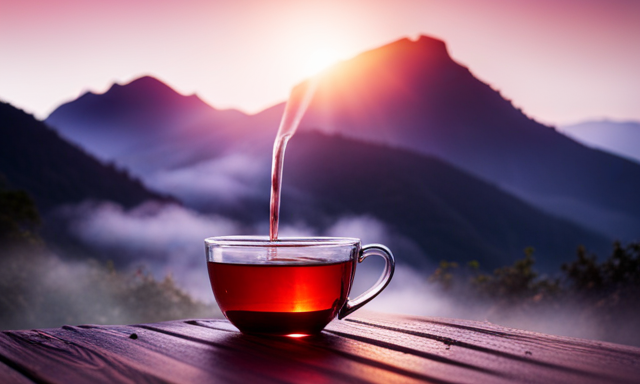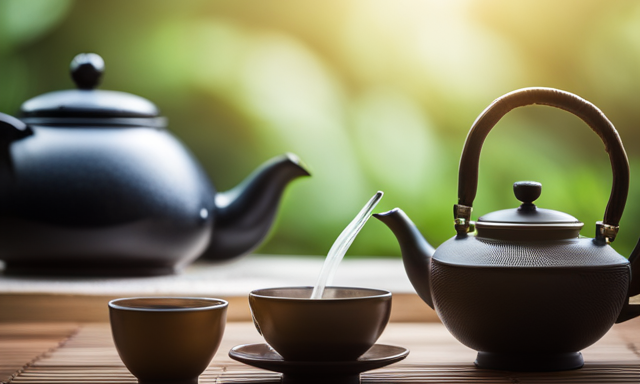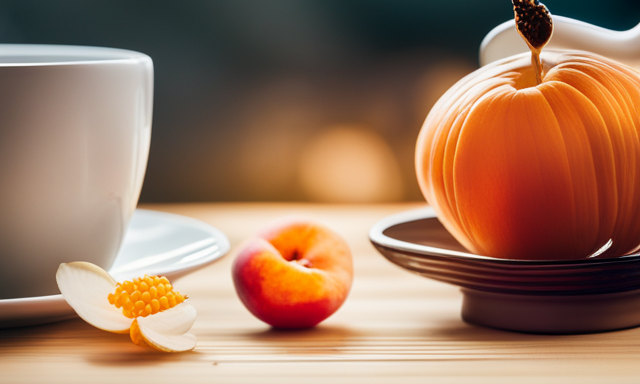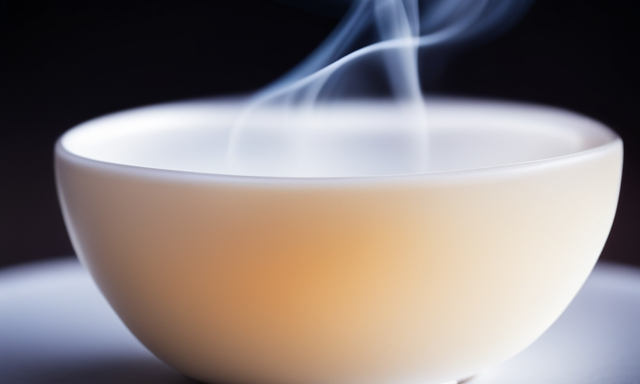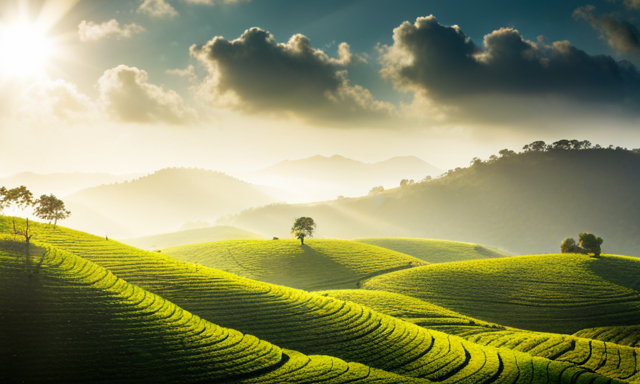Hey there! Ever wondered how much caffeine is in oolong tea? Well, you’re in the right place! As an avid tea drinker, I’ve always been curious about the caffeine content in different types of tea. Oolong tea, known for its unique flavor and numerous health benefits, has caught my attention lately.
In this article, we’ll dive into the world of oolong tea and explore just how much caffeine it contains.
But why is this important, you ask? Understanding the caffeine levels in oolong tea can help us make informed choices about our daily beverage consumption. Whether you’re looking for an alternative to coffee or simply want to enjoy a soothing cup of tea, knowing the caffeine content in oolong tea is key.
So, let’s get started and uncover the truth about oolong tea’s caffeine content!
Key Takeaways
- Oolong tea contains approximately 37 mg of caffeine per 8 oz.
- It has less caffeine than black tea but more than green tea.
- Oolong tea provides a moderate energy boost without jitters or insomnia.
- Individual caffeine tolerance should be considered when deciding on oolong tea consumption.
Understanding Oolong Tea
Oolong tea is a delicious beverage that contains a moderate amount of caffeine. It is a traditional Chinese tea that falls between green tea and black tea in terms of oxidation.
The brewing techniques for oolong tea can vary, allowing for a range of flavors and aromas to be enjoyed. Some common flavors include floral, fruity, and nutty notes, which are influenced by factors such as the tea leaves, processing methods, and brewing time.
The caffeine content in oolong tea can also vary depending on these factors, but on average, it contains about 30-50 milligrams of caffeine per cup. This makes it a great choice for those who want a boost of energy without the jitters.
Moving on to the caffeine content in oolong tea…
The Caffeine Content in Oolong Tea
Indulge in a cup of this delightful brew and you’ll be pleasantly surprised by the amount of pep it can give you. Oolong tea, known for its unique taste and numerous health benefits, also contains a moderate amount of caffeine. While it may not have as much caffeine as a cup of coffee, oolong tea still provides a gentle energy boost without the jitters or crash. On average, a cup of oolong tea contains about 37 milligrams of caffeine, which is about one-third the amount found in a cup of coffee. This moderate caffeine content makes oolong tea a great choice for those looking for a milder stimulant effect. Now, let’s explore how oolong tea compares to coffee in terms of caffeine content and other factors.
How Oolong Tea Compares to Coffee
When comparing oolong tea to coffee, it’s interesting to note the differences in caffeine content and overall effects. Oolong tea contains less caffeine than coffee, but more than green tea. Here are three key points to consider:
1) Oolong tea vs. espresso: While a shot of espresso contains around 63 milligrams of caffeine, a cup of oolong tea typically has about 37 milligrams. This means that oolong tea provides a moderate caffeine boost without the intense jolt that espresso can deliver.
2) Oolong tea vs. energy drinks: Energy drinks often contain high levels of caffeine, sometimes reaching up to 300 milligrams per serving. In comparison, oolong tea offers a more moderate caffeine content, making it a healthier choice for those seeking a gentler energy boost.
3) Oolong tea’s overall effects: Oolong tea provides a balanced combination of caffeine and other compounds that can promote alertness, focus, and relaxation without the jitters or crashes associated with coffee or energy drinks.
Considering the caffeine content and overall effects, oolong tea offers a unique alternative to both coffee and energy drinks. Now, let’s explore the health benefits of oolong tea.
Health Benefits of Oolong Tea
Oolong tea offers numerous health benefits, making it a popular choice among health-conscious individuals. One of its notable advantages is its potential for weight loss. The tea contains compounds that can boost metabolism and aid in fat burning. Studies have shown that regular consumption of oolong tea can lead to a decrease in body weight and waist circumference.
In addition to weight loss, oolong tea has been linked to improved heart health. It has the potential to lower blood pressure and reduce the risk of heart disease by improving cholesterol levels and promoting healthy blood vessel function. The antioxidants and polyphenols present in oolong tea contribute to these beneficial effects.
It is important to note that oolong tea does contain caffeine, which can have its own impact on health. As we explore the effects of caffeine on the body, it is essential to consider this factor.
The Effects of Caffeine on the Body
Get ready to experience the energizing effects of caffeine on your body as you sip on that aromatic cup of oolong tea. Here are four ways caffeine can impact your body:
-
Improved alertness: Caffeine stimulates the central nervous system, making you feel more awake and focused.
-
Boosted exercise performance: Caffeine has been shown to enhance endurance and reduce perceived exertion during physical activities.
-
Disrupted sleep: Caffeine can interfere with sleep by delaying the onset of sleep and reducing overall sleep duration. It is advised to limit caffeine intake in the evening.
-
Increased metabolism: Caffeine can temporarily increase your metabolic rate, potentially aiding in weight management.
Now that you know how caffeine affects your body, let’s move on to brewing tips for oolong tea. Enjoying a cup of this delightful beverage can be even more enjoyable when you know the best techniques for brewing it.
Brewing Tips for Oolong Tea
To make the most out of your oolong tea experience, let’s dive into some expert tips for brewing it to perfection. Oolong tea is known for its complex flavor profiles, which can vary depending on the brewing techniques used. Here are some key tips to keep in mind:
-
Water temperature: Oolong tea is best brewed with water that is around 190-200°F (88-93°C). This allows the leaves to fully unfurl and release their flavors.
-
Steeping time: The steeping time for oolong tea can vary depending on personal preference. Generally, a shorter steeping time of around 2-3 minutes will result in a lighter, more delicate flavor, while a longer steeping time of 4-5 minutes will yield a richer, fuller-bodied brew.
-
Multiple infusions: Oolong tea leaves can often be steeped multiple times, with each infusion bringing out different flavor notes. Experiment with different steeping times and water temperatures to discover your preferred taste.
By following these brewing tips, you can unlock the full potential of oolong tea’s unique flavor profiles. Now, let’s explore the various ways to enjoy oolong tea in different forms.
Enjoying Oolong Tea in Different Forms
Indulge in the diverse world of oolong tea by exploring its various forms and savoring the unique experiences they offer. Oolong tea can be enjoyed in different ways, each highlighting its distinct flavors and brewing techniques. Here are a few options to try:
-
Loose Leaf Oolong: Brew loose leaf oolong tea in a teapot or tea infuser to fully appreciate its complex flavors and aromas.
-
Oolong Tea Bags: For a quick and convenient option, oolong tea bags are a great choice. Simply steep in hot water and enjoy.
-
Oolong Tea Powder: Use oolong tea powder to make a frothy and invigorating cup of matcha-style oolong tea.
Exploring these various forms of oolong tea allows you to experience its diverse range of flavors and brewing techniques.
Transitioning into the next section, we will delve into the ritual and culture surrounding oolong tea.
The Ritual and Culture of Oolong Tea
Immerse yourself in the rich traditions and captivating rituals that surround the exquisite world of oolong tea. Oolong tea holds great ritual significance in many cultural traditions.
In China, for example, the Gongfu tea ceremony is a cherished practice that emphasizes the art of tea preparation and the appreciation of its flavors and aromas. This ceremony involves multiple steepings of oolong tea leaves in small teapots, with each infusion carefully poured into tiny cups for guests to savor. The delicate pouring technique and the attention to detail in each step reflect the deep respect for the tea and its cultural significance.
Beyond its cultural importance, oolong tea also offers numerous wellness benefits. Transitioning to the subsequent section about ‘oolong tea and wellness’, we can explore the ways in which this exquisite tea promotes health and well-being.
Oolong Tea and Wellness
When it comes to wellness, oolong tea has some impressive benefits. First, it is known for its relaxation and stress relief properties, making it the perfect beverage to unwind with after a long day.
Additionally, oolong tea is rich in antioxidants, which can help protect the body against damage caused by harmful free radicals.
So, if you’re looking for a natural way to relax and boost your overall well-being, oolong tea may be just what you need.
Relaxation and Stress Relief
To unwind and reduce stress, you can try sipping on a warm cup of oolong tea. This tea has been known to promote relaxation and provide a sense of calmness. Oolong tea contains an amino acid called L-theanine. This compound has been shown to increase alpha brain waves and promote relaxation without causing drowsiness. It works synergistically with caffeine to enhance mental alertness and focus while reducing anxiety and stress.
Oolong tea also contains other relaxing compounds such as flavonoids and polyphenols. These compounds have a calming effect on the nervous system. By incorporating oolong tea into your relaxation techniques and managing stress, you can create a peaceful and tranquil environment for yourself.
Transitioning into the subsequent section about ‘antioxidant properties,’ oolong tea also offers a range of health benefits beyond relaxation.
Antioxidant Properties
Indulging in a warm cup of oolong tea can transport you to a world of antioxidants and their incredible benefits for your overall well-being. Oolong tea is known for its antioxidant properties, which can help protect your cells from damage caused by harmful free radicals.
These antioxidants have been linked to a range of health benefits, including reducing the risk of chronic diseases such as heart disease and cancer. Additionally, oolong tea has been shown to aid in weight loss. Studies have suggested that the polyphenols in oolong tea can increase metabolism and fat oxidation, helping you shed those extra pounds.
So, if you’re looking to boost your antioxidant intake and support your weight loss journey, oolong tea may be a great addition to your daily routine.
Transitioning into the next section, it’s important to consider all the factors before making a decision about oolong tea.
Conclusion: Making the Choice for Yourself
Ultimately, it’s up to you to decide which tea is best for your caffeine needs. When making an informed decision, it’s important to understand the pros and cons of oolong tea. One advantage is that oolong tea contains less caffeine than black tea but more than green tea. This means it can provide a moderate boost of energy without causing jitters or insomnia. On the other hand, if you are sensitive to caffeine or trying to limit your intake, oolong tea may not be the best choice for you. To help you visualize the caffeine content, here is a comparison table:
| Tea Type | Caffeine Content (per 8 oz) |
|---|---|
| Oolong Tea | Approximately 37 mg |
| Green Tea | Approximately 28 mg |
| Black Tea | Approximately 47 mg |
| Coffee | Approximately 95 mg |
Remember, everyone’s caffeine tolerance is different, so it’s essential to listen to your body and make the choice that works best for you.
Frequently Asked Questions
Does oolong tea contain more caffeine than black tea?
Yes, oolong tea contains more caffeine than black tea. However, the benefits of oolong tea extend beyond its caffeine content. It offers a unique flavor profile, ranging from fruity to woody, making it a popular choice among tea enthusiasts.
Can oolong tea be consumed by pregnant women?
Oolong tea should be consumed in moderation during pregnancy. While it may have potential benefits, it can also contain caffeine and affect fetal development. It is best to consult with a healthcare provider regarding its safety and any potential risks, such as inducing labor.
Are there any side effects of consuming too much caffeine from oolong tea?
Excessive caffeine intake from oolong tea can lead to various side effects such as increased heart rate, anxiety, and digestive issues. Additionally, it can negatively impact sleep quality, causing insomnia or disrupted sleep patterns.
How does the caffeine content in oolong tea compare to green tea?
The caffeine content in oolong tea is generally higher than in green tea. However, both teas offer various health benefits such as antioxidant properties, aiding in weight management, and promoting heart health.
Can oolong tea help with weight loss?
Oolong tea can help with weight loss due to its benefits in boosting metabolism. Studies suggest that oolong tea increases fat burning and may aid in weight management when combined with a healthy diet and exercise routine.
Conclusion
When it comes to caffeine content, oolong tea offers a delightful alternative to coffee. It contains an average of 37 milligrams of caffeine per 8-ounce serving, providing a moderate energy boost without the jitters often associated with coffee. Additionally, studies have shown that oolong tea can boost metabolism and aid in weight loss. So, next time you’re in need of a pick-me-up, consider reaching for a cup of oolong tea. It’s a flavorful and healthful choice that won’t disappoint.

